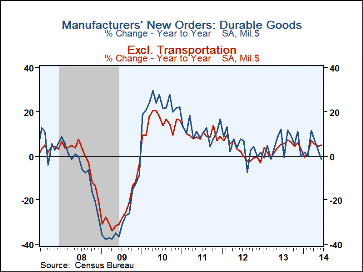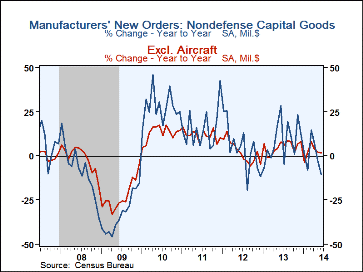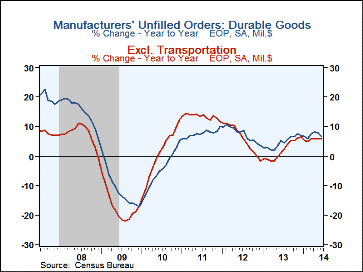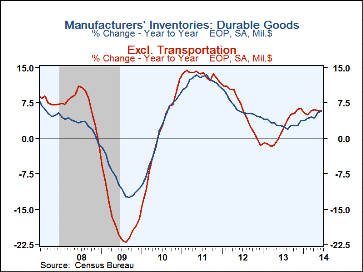 Global| Jul 25 2014
Global| Jul 25 2014U.S. Durable Goods Orders Recover M/M as Bookings for Capital Goods Jump
by:Tom Moeller
|in:Economy in Brief
Summary
New orders for durable goods improved 0.7% (-1.6% y/y) during June and reversed most of an unrevised 1.0% May decline. The increase roughly matched expectations in the Action Economics Forecast Survey. A 1.8% rebound (-10.4% y/y) in [...]
New orders for durable goods improved 0.7% (-1.6% y/y) during June and reversed most of an unrevised 1.0% May decline. The increase roughly matched expectations in the Action Economics Forecast Survey. A 1.8% rebound (-10.4% y/y) in nondefense capital goods orders paced last month's overall orders increase. The May figure was revised, however, to show a 2.1% decline rather than the 0.5% drop reported initially. Nondefense capital goods orders excluding aircraft improved 1.4% (1.9% y/y). The increase followed declines of roughly 1.2% in the prior two months. Nondefense aircraft bookings gained 8.2% (-41.7% y/y) after two months of significant shortfall while defense aircraft orders jumped 15.3% (25.3% y/y), roughly the same as during the prior two months. Orders for motor vehicles & parts fell 2.1% (+1.6% y/y) following a 1.6% rise.
New orders for machinery jumped 2.4% (7.9% y/y) and mostly recovered two months of sharp decline. Primary metals orders increased 0.9% (8.6% y/y) after a 2.6% rise. Orders for computers & electronic products gained 0.8% (0.1% y/y). The rise followed two months of roughly 1.9% decline. Orders for computers & related products were off 13.9% (-4.1% y/y) and reversed most of the prior two months' increases. Communications equipment bookings slipped 0.6% (-21.9% y/y) after two months of significant shortfall. Electrical equipment bookings slipped 0.2% (-2.7% y/y). That added to a 2.9% drop and fabricated metal orders also moved 0.2% lower (+2.2% y/y) after a 0.9% rise.
Shipments of durable goods edged 0.1% higher (3.7% y/y) but were roughly unchanged during the last three months. Shipments excluding the transportation sector also were nearly unchanged for three months. Unfilled orders for durable goods gained 0.8 (6.6% y/y), about as they did during the prior three months. Backlogs excluding transportation rose 0.9% (5.9% y/y), the fourth consecutive month of firm increase. Inventories gained 0.4% (5.8% y/y) after a 1.0% jump. Much of the increase reflected transportation product inventories which rose 0.7% (10.7% y/y).
The durable goods figures are available in Haver's USECON database. The Action Economics consensus forecast figure is in the AS1REPNA database.
| Durable Goods NAICS Classification | Jun | May | Apr | Y/Y | 2013 | 2012 | 2011 |
|---|---|---|---|---|---|---|---|
| New Orders (SA, %) | 0.7 | -1.0 | 0.9 | -1.6 | 5.2 | 4.1 | 11.0 |
| Transportation | 0.6 | -2.8 | 1.8 | -13.4 | 7.9 | 8.9 | 14.9 |
| Total Excluding Transportation | 0.8 | -0.1 | 0.4 | 4.9 | 4.0 | 2.1 | 9.5 |
| Nondefense Capital Goods | 1.8 | -2.1 | -0.6 | -10.4 | 8.7 | 3.7 | 15.3 |
| Excluding Aircraft | 1.4 | -1.2 | -1.1 | 1.9 | 5.0 | 2.1 | 11.6 |
| Shipments | 0.1 | -0.1 | 0.1 | 3.7 | 3.7 | 6.4 | 9.4 |
| Inventories | 0.4 | 1.0 | 0.2 | 5.8 | 3.8 | 4.5 | 10.8 |
| Unfilled Orders | 0.8 | 0.7 | 0.9 | 6.6 | 7.0 | 3.6 | 10.0 |
Tom Moeller
AuthorMore in Author Profile »Prior to joining Haver Analytics in 2000, Mr. Moeller worked as the Economist at Chancellor Capital Management from 1985 to 1999. There, he developed comprehensive economic forecasts and interpreted economic data for equity and fixed income portfolio managers. Also at Chancellor, Mr. Moeller worked as an equity analyst and was responsible for researching and rating companies in the economically sensitive automobile and housing industries for investment in Chancellor’s equity portfolio. Prior to joining Chancellor, Mr. Moeller was an Economist at Citibank from 1979 to 1984. He also analyzed pricing behavior in the metals industry for the Council on Wage and Price Stability in Washington, D.C. In 1999, Mr. Moeller received the award for most accurate forecast from the Forecasters' Club of New York. From 1990 to 1992 he was President of the New York Association for Business Economists. Mr. Moeller earned an M.B.A. in Finance from Fordham University, where he graduated in 1987. He holds a Bachelor of Arts in Economics from George Washington University.
More Economy in Brief
 Global| Feb 05 2026
Global| Feb 05 2026Charts of the Week: Balanced Policy, Resilient Data and AI Narratives
by:Andrew Cates










